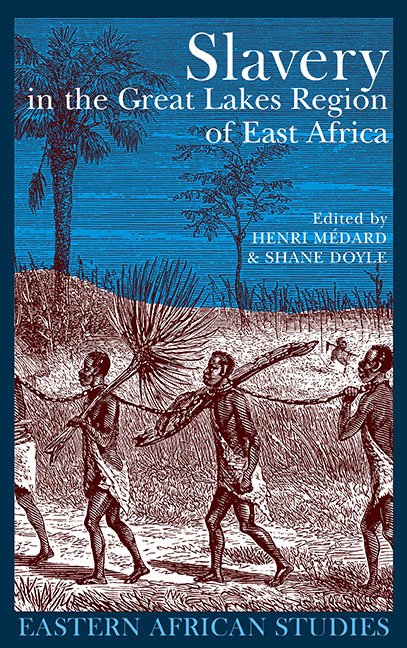Book contents
- Frontmatter
- Dedication
- Contents
- List of Maps & Tables
- Notes on Contributors
- Introduction
- 1 Violence, Marginality, Scorn & Honour: Language evidence of slavery to the eighteenth century
- 2 Notes on the Rise of Slavery & Social Change in Unyamwezi c. 1860 –1900
- 3 Slavery & Forced Labour in the Eastern Congo 1850 –1910
- 4 Legacies of Slavery in North West Uganda: The story of the ‘One-Elevens’
- 5 Human Booty in Buganda: Some observations on the seizure of people in war c.1700 –1890
- 6 Stolen People & Autonomous Chiefs in Nineteenth-Century Buganda: The social consequences of non-free followers
- 7 Women's Experiences of Enslavement & Slavery in Late Nineteenth- & Early Twentieth-Century Uganda
- 8 Slavery & Other Forms of Social Oppression in Ankole 1890 –1940
- 9 The Slave Trade in Burundi & Rwanda at the Beginning of German Colonisation 1890 –1906
- 10 Bunyoro & the Demography of Slavery Debate: Fertility, kinship & assimilation
- References
- Index
6 - Stolen People & Autonomous Chiefs in Nineteenth-Century Buganda: The social consequences of non-free followers
Published online by Cambridge University Press: 11 August 2017
- Frontmatter
- Dedication
- Contents
- List of Maps & Tables
- Notes on Contributors
- Introduction
- 1 Violence, Marginality, Scorn & Honour: Language evidence of slavery to the eighteenth century
- 2 Notes on the Rise of Slavery & Social Change in Unyamwezi c. 1860 –1900
- 3 Slavery & Forced Labour in the Eastern Congo 1850 –1910
- 4 Legacies of Slavery in North West Uganda: The story of the ‘One-Elevens’
- 5 Human Booty in Buganda: Some observations on the seizure of people in war c.1700 –1890
- 6 Stolen People & Autonomous Chiefs in Nineteenth-Century Buganda: The social consequences of non-free followers
- 7 Women's Experiences of Enslavement & Slavery in Late Nineteenth- & Early Twentieth-Century Uganda
- 8 Slavery & Other Forms of Social Oppression in Ankole 1890 –1940
- 9 The Slave Trade in Burundi & Rwanda at the Beginning of German Colonisation 1890 –1906
- 10 Bunyoro & the Demography of Slavery Debate: Fertility, kinship & assimilation
- References
- Index
Summary
Introduction
A new form of chiefship, the ekitongole, emerged in the Buganda kingdom in the eighteenth century. An ekitongole (pl. ebitongole) was a collection of people under a chief organised to do a particular work on a particular piece of land. While older chiefships bore the name of their territory or a name which asserted an ancient service of the chief to the monarch, the names of ebitongole announced their purpose. The Ekikinakulya, for example, was created and named ‘for the purpose of things to eat’, and Ekibukula Mabira, ‘for the purpose of opening up of the forests’, was created to supply hunters who were needed to drive away elephants and buffaloes that were attacking people. Kabakas (kings) created the first ebitongole, but chiefs who grew wealthy through trade created their own ebitongole in the late nineteenth century.
The implications of the emergence of a new form of chiefship tied particularly to production raise fascinating issues which have not yet been fully explored by historians of Buganda. This essay argues that ebitongole chiefship became a mechanism for organising the labour of war captives, and that this incorporation of war captives in ebitongole profoundly destabilised the Buganda kingdom.
This interpretation challenges well-accepted habits of thought about Buganda. It suggests an alternative to the idea that ebitongole chiefships were part of a consolidation of royal power, the making of a ‘modernising bureaucracy’, in which royal power replaced clan authority. Although historians M.S.M. Kiwanuka, John Rowe and Michael Twaddle have all noted that this concept oversimplifies the relationship of kings, clans and chiefs, the idea of the modernising Baganda continues to appear in scholarly works – most recently as ‘defensive modernisers’ in Philip Curtin's study of imperialism. The increasing power of kings to allocate land in chiefships does not tell the whole story of ebitongole, however. This emerging institution can also be understood as an attempt to institutionalise enslavement which contributed to increasing social violence and the collapse of patterns of reciprocal obligation that had previously drawn the polity together. The underlying premise of my argument is that the masses of captive people brought into Buganda during its wars of expansion represented a significant challenge to the polity; they caused a crisis in the ordering of the kingdom, and led to a drastic decline in the status of ordinary Baganda, especially women.
- Type
- Chapter
- Information
- Slavery in the Great Lakes Region of East Africa , pp. 161 - 173Publisher: Boydell & BrewerPrint publication year: 2007



